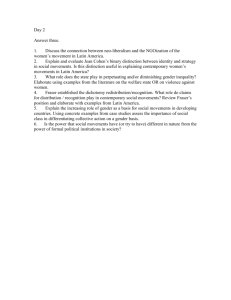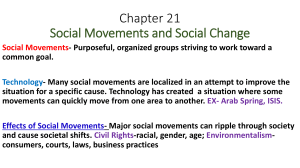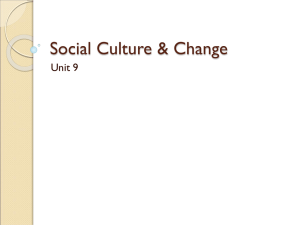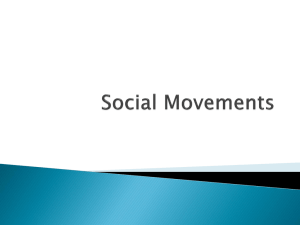Chapter 23, Social Change
advertisement
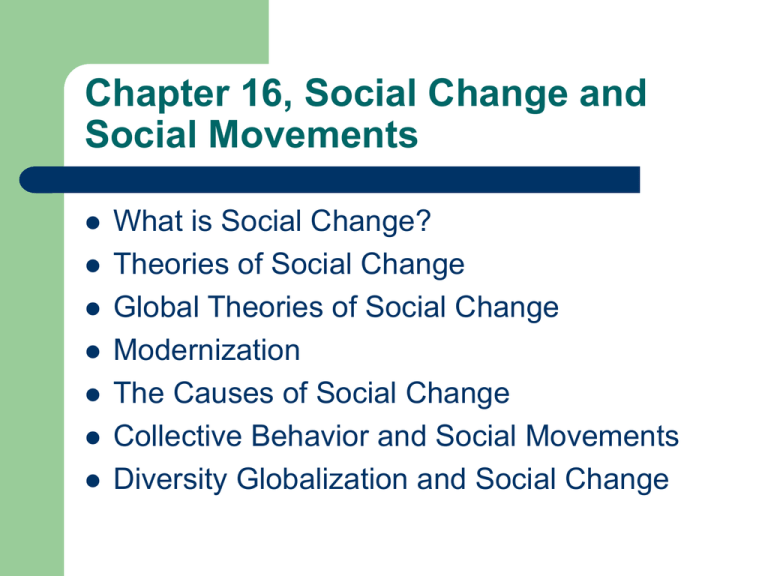
Chapter 16, Social Change and Social Movements What is Social Change? Theories of Social Change Global Theories of Social Change Modernization The Causes of Social Change Collective Behavior and Social Movements Diversity Globalization and Social Change Characteristics of Social Change 1. 2. 3. 4. Social change is uneven. The onset and consequences of social change are often unforeseen. Social change often creates conflict. The direction of social change is not random. Functionalist Theory of Social Change Societies change from simple to complex, from undifferentiated to highly differentiated division of labor. Technology is the primary cause of social change. Conflict Theory of Social Change Conflict is an inherent component of social relations. Economic conflict between social classes is the cause of social change. Cyclical Theory of Social Change Societies go through a life cycle or life span. The necessity for growth is the primary cause of social change. Cyclical Theory: Three Phases 1. 2. 3. Idealistic culture - society wrestles with the tension between the ideal and the practical. Ideational culture - emphasizes faith and new forms of spirituality. Sensate culture - stresses partial approaches to reality and involves the hedonistic. Characteristics of Modernization Decline of small, traditional communities. Traditional ties of kinship decrease and society experiences feelings of uncertainty and powerlessness. Decline in importance of religious institutions and people begin to feel they have lost control of their lives. Global Theories of Social Change Globalization involves increased interconnectedness that can erase or magnify cultural differences. Modernization Theory - global development is a worldwide process affecting all societies touched by technological change. Global Theories of Social Change World Systems Theory - nations are members of a worldwide system of unequal political and economic relationships. Dependency theory - industrialized nations tend to imprison developing nations through trade and debt dependency. Causes of Social Change Collective Behavior Cultural Diffusion Technological Innovation Social Movements Inequality Population War Characteristics of Collective Behavior 1. 2. 3. Represent the actions of groups of people, not individuals. Involve new relationships that arise in unusual or unexpected circumstances. Capture the changing elements of society more than other forms of social action. Characteristics of Collective Behavior 4. 5. 6. May mark the beginnings of more organized social behavior. Exhibit patterned behavior, not the irrational behavior of crazed individuals. Usually appear to be highly emotional, even volatile. Characteristics of Collective Behavior 7. 8. Involve people communicating extensively through rumors. Are often associated with efforts to achieve social change. Type of Social Movements Personal transformation movements hippie, new age Social change movements environmental and animal rights movements Reactionary movements Aryan Nation, Right-to-Life Elements Necessary for Social Movements 1. 2. 3. 4. Pre-existing communication network. Pre-existing grievance. Precipitating incident. Ability to mobilize. Theories of Social Movements Resource mobilization theory - social movements develop when people can compete for and gain resources needed for mobilization Political process theory - social changes provide the conditions that spawn social movements. Theories of Social Movements New movement theory links culture, ideology, and identity to explain how people in groups frame events, and how new identities are forged within social movements.



